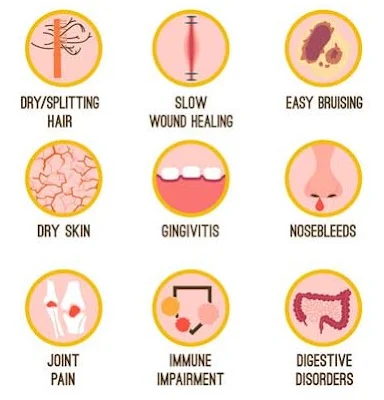Introduction:
Vitamin C, or ascorbic acid, is a vital nutrient essential for various bodily functions. Its deficiency can lead to several health issues. Identifying signs of vitamin C deficiency and taking immediate corrective actions is crucial for maintaining overall health and well-being.
Signs of Vitamin C Deficiency:
1. Fatigue and Weakness:
Feeling constantly tired and experiencing weakness could indicate a lack of vitamin C. This deficiency affects energy levels and can lead to a feeling of lethargy.
2. Scurvy Symptoms:
Scurvy, a severe vitamin C deficiency, manifests as swollen and bleeding gums, joint pain, and easy bruising or bleeding. These symptoms are rare but severe indicators of long-term deficiency.
3. Slow Wound Healing:
Vitamin C is essential for collagen synthesis, and vital for wound healing. If cuts and bruises take longer to heal, it could signify inadequate vitamin C levels.
4. Dry, Damaged Skin:
A lack of vitamin C affects skin health, leading to dryness, rough texture, and potential damage due to reduced collagen production.
5. Frequent Infections:
Vitamin C plays a role in the immune system, aiding in fighting off infections. Frequent colds, respiratory issues, or other infections could indicate a weakened immune response due to deficiency.
Immediate Actions to Overcome Vitamin C Deficiency:
1. Increase Vitamin C Intake:
Incorporate more vitamin C-rich foods into your diet, such as citrus fruits (oranges, lemons), strawberries, kiwi, bell peppers, broccoli, and leafy greens. Supplementing with vitamin C tablets might be necessary in severe cases.
2. Consider Supplements:
Consult a healthcare professional for guidance on vitamin C supplements. They can recommend suitable supplements and dosages based on individual needs.
3. Consume Raw Fruits and Vegetables:
Consume fruits and vegetables raw or lightly cooked to preserve the maximum vitamin C content. Avoid prolonged heating or exposure to water, as vitamin C is heat and water-sensitive.
4. Balanced Diet:
Ensure a well-rounded diet that includes a variety of nutrients, as vitamin C works in synergy with other vitamins and minerals. A balanced diet supports overall health and aids in optimal nutrient absorption.
5. Seek Medical Advice:
If you suspect vitamin C deficiency or experience persistent symptoms, consult a healthcare professional. They can conduct tests to determine deficiency levels and provide tailored advice and treatment.
Conclusion:
Recognizing the signs of vitamin C deficiency is crucial for timely intervention. By promptly addressing the deficiency through dietary changes, supplements, and seeking professional guidance, you can overcome vitamin C deficiency and restore optimal health. Prioritize a balanced diet rich in vitamin C to maintain overall well-being and prevent future deficiencies.





No comments:
Post a Comment